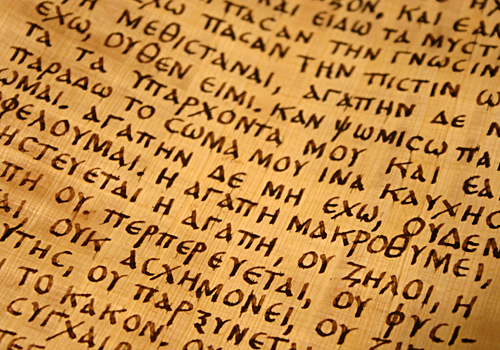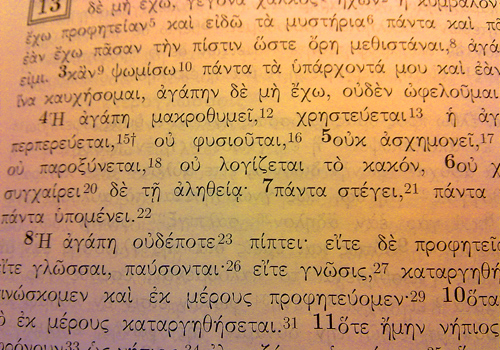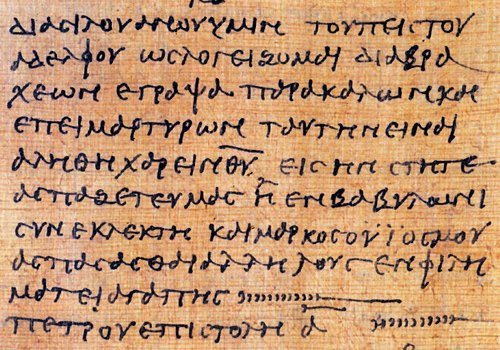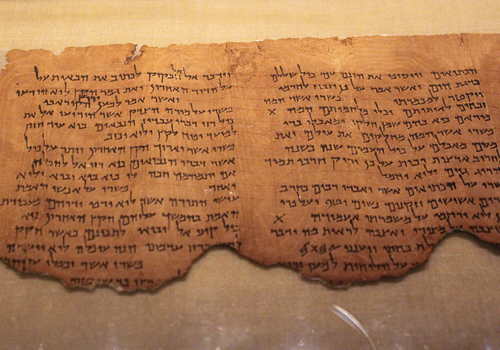Shortcuts for Beginning Koine Greek
This page gives some shortcuts for beginning to learn Koine Greek. Most of these are just things I thought up myself, to help me remember some of the words and grammar. I'm only new at this, so not everything is guaranteed to be 100% textbook-correct yet.
I'm studying beginning Koine (Common, Biblical) Greek at Morling College this year. So far this page will consist mainly of things featured in the book "Elements of New Testament Greek" by Jeremy Duff. Though the same things are taught in most other Koine Greek courses, the order in which they are learned may vary.
See also: How I Began Learning the Biblical Languages, Greek Meaning Quiz, Greek Word Quiz, Free Greek course online at Morling College in Sydney (external link), Shortcuts for Beginning Biblical Hebrew.
This web page consists mainly of quick tips to aid learning, rather than full-length explanations of the concepts. Most of it probably won't make much sense unless you're studying the beginning stages of a Koine Greek course.
Koine Greek Vocabulary Quizzes on Christ.net.au
Use these links for: Greek Word Quiz, Greek Meaning Quiz. Each one quizzes in a different direction, one from English to Greek and one from Greek to English.
Note that the easiest Greek quiz for beginners is the Word Quiz above with transliteration turned on (which is the default). For this, all you really need to know is the Greek Alphabet. If you turn off the transliteration, you need to know the meanings of the words. For the Meaning Quiz, having the transliteration on doesn't give the answers away nearly as much.
Note also that if you're using the textbook "Elements of New Testament Greek", I'll be adding options to choose questions from the vocabulary words from each chapter each week as I go through them this year. Currently I've only done Chapters 2 and 3, but I should be adding about one chapter a week from now on. There are now extra options to select questions from the vocabulary words up to and including any chapter you select. These are all found using the drop down box before the blue "Load New Random Quiz" button (which defaults to "the 15 most popular words"). For the "Elements of New Testament Greek" chapters, select an option such as "Duff NT Greek Chapter 2" and the quiz will be made of 10 random questions from only the vocabulary words in that chapter.
![]() UPDATE: Words from Duff NT Greek in the quizzes are currently up to chapter 3.
UPDATE: Words from Duff NT Greek in the quizzes are currently up to chapter 3.
Because the questions (and the multiple choice options) are generated randomly, you can do them many times over, and learn new and different words each time.
Chapter 2 of Duff
I'm learning Chapter 2 for this week. When I've done this I'll go back and add a few things from Chapter 1. I'm not sure how much I'll be able to keep up with writing about the chapters as the coursework gets more intense — but I'll see how I go as the year progresses...
Vocabulary Words
Much of the effort of learning a language, and especially a biblical language (as opposed to one that's spoken in real life), is learning a lot of words. I've heard of many people who have studied the biblical languages at Bible Colleges and haven't followed up with what they learned, and forgot a lot of it. I've also heard that a lot of this happens because people haven't learned enough vocabulary to be able to read the Bible in the original languages well enough to "just do it" as part of (let alone the main part) of their regular Bible reading.
After hearing this — I figured it's going to be important to learn a lot of words, and learn them well.
I spent some time last year learning some of the words, to break up the intensity of the workload of studying this formal course (and doing both Hebrew and Greek at once) over more time. I used different books last year (mainly "Basics of Biblical Greek" by Bill Mounce). The textbook by Duff teaches the words in a different order, and I didn't already know most of the words from Chapter 2.
Here are some ideas I thought of to help memorise them. Some of the "transliterations" I'm using are my own very informal creation, and not mean to conform to any kind of officially recognised system. Others are copied and pasted from the internet, not sticking to any one particular system.
The way I'm finding them online is to type an approximate English rendition of the word into Google followed by greek strongs. e.g. 'ago greek strongs', or 'ballo greek strongs' (but not using quotes in Google).
I've added the words from Chapter 2 that I found the hardest to remember, plus a few others that didn't already have meaning hints/suggestions for them in the textbook:
Words
ἄγω — argo — I lead, bring — argonauts — Jason and the Argonauts was a movie, a TV series, and part of a story from ancient Greek mythology. I never saw nor read any of the stories but being big heroes, presumably they were leaders.
ἀκούω — akouó — ak-oo'-o — acoustic — sound — I hear, listen to.
βλέπω — blepō — ble'-pō — I see, watch. I put this under the word for "hear" since hear and see go together. I could remember ἀκούω/acoustic easily enough, but not so easily βλέπω/see. Also think blepo = a blip on the radar that you see, when you're watching the radar. Blepo. I see a blip on the radar.
βάλλω — balló — bal'-lo — I throw — origin of ball, ballistic, the physics of ballistics of a cannon ball, ballistic missile, ICBM.
Three 'Car' Words
These are quite silly, but the ideas worked to help me remember them. The next three words are the three "car" words from Chapter 2, in chronological order beginning from when "you get the car":
λαμβάνω — lambano — lambo — Lamborghini — I take, receive. To take. I receive, get. I take and receive a Lamborghini.
ἔχω — echō — e'-khō — I have, hold — EXA, as in Nissan EXA Turbo. This was my friend from high school's first car (and we drove it to many car yards to check out the sports cars, including Lamborghinis). The word means "I have, hold". The Lamborghini was too expensive to hold onto, but I have and hold a Nissan EXA. ἔχω.
τηρέω — téreó — tay-reh'-o — I keep — Torana (the eta η looks like an n) — Holden Torana. I only held onto the EXA for a while, but "I keep" my Holden Torana, and it's worth more if I keep its original (s)tereo.
So, in order — I take; then have/hold; then keep.
I take the Lambo; but have/hold onto the EXA; and then finally, keep the Torana with its stereo.
More Words
ζητέω — zéteó — dzay-teh'-o — I seek — Since the eta η sounds like a long "e" but looks like an "n", the start of this word reminds me of "Zen". It means "I seek". Imagine a Zen Monk, what do they do, they seek (enlightenment, or something).
ἄρτος — artos — ar'-tos — bread, a loaf. "Artos" sounds a bit like "artist". A con artist wants to steal your "bread".
ποιέω — poieó — poy-eh'-o — I do, make. I can't think of one, but when I do make up a good memory aid, I'll write it in here, pronto.
νόμος — nomos — no'-mos — nom nom nom nom — law — eat up a scroll of the law, like Ezekiel.
ὄχλος — ochlos — o'-khlos — a crowd, people, multitude. For some reason I find this one hard to remember.
δοῦλος — doulos — dü'-los — slave, servant. A "doula" is a type of informally trained midwife. I knew this one but I found the Hebrew word for it harder to remember. Which I also have to know for next week. עֶבֶד — ebed — eh'-bed.
The Six Word Endings for Present Tense Verbs
There are more types of these to learn later on but these are the six for now:
This is what I used to memorise them:
- -ω — I am o. (Jesus said "I am Alpha and Omega". Shorten this to "I am Omega".)
- -εις — You are eis.
- -ει — He is ei. (He/she/it is ei). She is ei. It is ei. (ei pronounced like ay which rhymes with bay.)
- -oμεν — We are ommen. (This sounds like some kind of meditation cult, om, om, om, we are om-men. Imagine a group of weird cult members all chanting together, as if hypnotised, "We are ommen".) Note I didn't use "omen" which is a more literal spelling, but the English word "omen" is usually pronounced with a long "o", which would be omega in Greek, not omicron.
- -ετε — Youse are etteh/ettay. (I had a friend who used to live at Ettalong, and she said "youse" a lot.)
- -ουσιν — They are oosin.
When the stem (i.e. the first part, not including the ending) of the verb ends in an epsilon, the endings 4 and 5 above change:
4. changes from -oμεν to -oυμεν. ("ommen" becomes "oomen".)
5. changes from -ετε to -ειτε. ("ettay" becomes "ay-tay".)
Also in 1. (i.e. the ending -ω), the epsilon before the omega disappears.
I found it easiest to just remember what's above first, without thinking too much about the next two sentences below (nor their equivalents in the textbook).
Actually in all the others (2, 3, and 4) an epsilon disappears also, but since all these endings begin with epsilon, the final word still has one (but not a double) epsilon there in the word.
Another way to say this is that εε changes to ει (seen in 2, 3, and 5 above), εo changes to oυ (seen in 4 and 6 above), and if the ε is followed by any long vowel, the ε disappears (seen in 1 above).
Four Endings for (Masculine) Nouns
Again, I'll type them out properly with Greek font sometime. The last three all rhyme.
Singular:
- hoh logos — the word — nominative = subjective = doer
- tonn logon — the word — accusative = objective = done to
Plural:
- hoy logoy — hoi logoi — the words — nominative = subjective = doer
- toose logoose — the words — accusative = objective = done to
A hint to remember the accusative singular case endings all finish with a nu, think of the word "accusatiνe". (Even though an english v is not a nu, it works to help remember the ending).
Chapter 3 of Duff
Here are a few short notes from Chapter 3.
Genitive Case
The genitive case is called the possessive case in English.
φιλω τον λογον του θεου = I love the word of God.
του θεου (of God) is in the genitive (i.e. possessive) case. In English it could be written as either "of God" or "God's". That is, in this example, either as "the word of God", or "God's word".
Dative versus Accusative Cases
The accusative case = the direct object, from last week's chapter. The dative case = the indirect object, from this week.
Below is a memory aid for which is which:
"I am cooking for my wife" = Indirect Object = Very romantic = Dative Case. It's the dative case because going on a date, and cooking for your wife, are romantic.
"I am cooking my wife" = Direct Object = Not romantic = Illegal = Accusative case. It's the accusative case because you will be accused of a capital crime.
Cover image by Lemonakis Antonis / Shutterstock. A little islet with fantastic transparent waters, Antiparos island, Cyclades, Greece. The Apostle Paul travelled around the Greek Islands spreading the Gospel of Jesus Christ.








